Truth under fire: Survey shows areas of agreement, concern on U.S. airstrike
Voters are paying attention – but misunderstandings about Israel and Iran run deep
In the wake of U.S. airstrikes on Iranian nuclear facilities (and the subsequent shaky ceasefire), a new our latest Florida survey reveals a public grappling with complexity – concerned about consequences and wary of escalation, while largely understanding of or even supportive toward the goals behind the action.
Here are seven takeaways that stood out from our survey of 1,000 likely Florida voters, each described in more detail below:
People are paying attention to a degree uncommon for foreign affairs
There is widespread bipartisan concern about possible consequences
Still, 2 in 3 voters also see at least one justification for the action
Parties are divided on who is primarily responsible for the escalation
There’s a strong belief that the Iranian regime doesn’t represents its people
Iran’s ties to terrorism are widely recognized, but some misunderstandings persist
Misunderstandings about Israel are rampant, and consequential
These results are likely a strong reflection of national sentiment: Florida serves as an unparalleled proxy for national opinion. As we’ll explore in detail in an upcoming Substack, demographically Florida closely mirrors the U.S. across key indicators like race, religion, education, income, and homeownership, with most metrics falling within 1-2 percentage points of national averages. Its presidential elections match national results much better than other battleground states, and public opinion in Florida consistently tracks within a point of national sentiment on hot-button issues like marijuana legalization or gender policy in sports. In other words, Florida provides a statistically sound lens and a reliable mirror of national trends.
People are paying attention
A striking 83% of likely Florida voters say they’ve heard at least a fair amount about the recent strikes, including nearly half (48%) who report knowing “a great deal.”
While there are no differences between parties in net awareness, a larger share of Republicans say they’ve heard “a great deal” about the airstrikes (56%) than have Democrats (44%) and nonpartisans (45%). Similarly, those older than 45 appear to be paying more attention to this news than are younger voters, with more than half (52%) of the older crowd watching closely.
The group most tuned in to this news is, unsurprisingly, the 23% of Floridians who say they personally know someone from Iran. Among these Floridians, 94% have heard at least a fair amount about the airstrike, including 63% who have heard a great deal.
This level of public attention is uncommon regarding foreign affairs, and it reflects how much this issue has penetrated the public consciousness.
Concern is widespread, across the aisle
Despite differing political views, 91% of Floridians have at least one concern about the consequences of the airstrike – including 98% of Democrats, 88% of nonpartisans, and 85% of Republicans. These concerns include the possibility of:
Retaliation on U.S. soil (80%)
Death or injury of U.S. troops (77%)
A broader war (75%)
Harm to trade or the economy (62%)
Potential violations of international law (53%)
Predictably, the biggest differences between parties regard violations of law, where 84% of Democrats raise this as an issue but just half of nonpartisans (49%) and 18% of Republicans share the concern.
But wide partisan gulfs exist across the board, with Democrats considerably more worried about possible repercussions from the U.S. airstrike than Republicans express (or at least admit).
2 in 3 also see at least one justification for the move
People are certainly capable of holding complex views. For example, it’s possible to oppose President Trump overall but support a specific military decision, or to support the president overall but oppose this strike. Indeed, 2 in 3 respondents in our survey said they believe it’s possible to be both deeply concerned about consequences of this airstrike while also believing it was the right choice or was justified.
That same overall portion – 67% – say they believe President Trump’s move was justified for at least one reason. This includes 93% of Republicans, 72% of nonpartisans, and 40% of Democrats. These reasons include:
A necessity to limit Iran’s nuclear capabilities (60%)
Iran’s active funding of terrorism around the world (55%)
Iran calling for “Death to America” and the intent to cause suffering (49%)
Iran’s decades of acts against its own people (46%)
The possibility that without intervention, Iran would have obliterated Israel (37%)
There are significant partisan and age differences in responses to each of these rationales, but each was more often expressed by Republicans and those over age 45. Most notably, an overwhelming 91% of Republicans believe it was necessary to limit Iran’s nuclear capabilities, but this view was voiced by just 1 in 3 Democrats (33%).
Similarly, more than 8 in 10 Republicans find justification in the fact that Iran was funding global terrorism and calling for “Death to America” – but fewer than 3 in 10 Democrats believe that was enough to warrant taking action. And while 2 in 3 Republicans worried that Iran would soon make good on its long promise to wipe Israel from the map, just 17% of Democrats found that prospect concerning enough to justify U.S. military intervention.
Who is primarily responsible for the escalation? No surprise: The parties are divided
Overall, if forced to pick which country – Israel or Iran – is primarily responsible for escalating the conflict, 61% of Floridians point to Iran; the remaining 39% place more blame on Israel. But there are steep differences in this perception by party. More than 9 in 10 Republicans (91%) see Iran as more culpable for escalating tensions, as do 60% of nonpartisans. But just 21% of Democrats agree.
Yes, Israel’s earlier strike on the Islamic Republic’s nuclear facilities and top military officials contributed to Iran’s most recent attacks, which included the deployment of hundreds of ballistic missiles and armed drones – including one aimed at a civilian hospital.
However, Israel’s actions weren’t unprovoked, but rather in direct response to Iran’s ongoing efforts to destroy the world’s only Jewish state. Iran played a direct role in financing and organizing Hamas’ October 7, 2023 attack on Israel, it advances propaganda on U.S. and European college campuses, and it runs various state-controlled media channels that broadcast beyond its borders, stoking disinformation and hate. It also funds Hezbollah and Houthi combatants to carry out attacks on Israel, inflame internal conflicts within their own countries, and fuel instability throughout the region.
Blaming Israel for escalating the conflict because of its response to Iranian aggression is like blaming firefighters for causing water damage to a burning home, while excusing the arsonist who lit the match.
If not already clear, it’s my opinion that in this analogy, Iran is the arsonist. And its sights go far past destroying Israel alone.
There’s a strong belief that the Iranian regime doesn’t represent its people
Beyond people’s perceptions of how Israel and Iran split responsibility for this escalation, there’s very little disagreement regarding Iran’s treatment of its own people. Nearly all Floridians – 96% – express awareness that Iran changed in at least one antidemocratic way following the 1979 Islamic Revolution.
Specifically, 91% say that since that time, Iran has restricted freedom of the press, and nearly as many (88%) know that it enforces a mandatory dress code for women based on its interpretation of Islamic law. Another 85% believe that Iran replaced civil justice with religious courts, and a similar portion (83%) recognize that it transitioned from a more secular to a religious education system.
Their personal preferences aside, more than 8 in 10 Floridians (82%) believe most Iranian civilians today support removing the Islamic regime from power.
This belief is held by 90% of Republicans, 80% of Democrats, and 75% of non-partisans. Nearly all of those older than 45 believe Iranians largely want the Islamic regime removed (94%) – a perception shared by 73% of those under age 45. Finally, 9 in 10 (90%) of those who personally know someone from Iran believe most Iranians welcome a regime change.
Iran’s ties to terrorism are widely recognized, but some misunderstandings persist
Most Floridians (93%) say they are aware that Iran funds at least one terrorist group, like Hamas (83%), Hezbollah (83%), and the Houthi rebels (79%). This is true overall for more Republicans (92%) and nonpartisans (84%) than Democrats (74%). And nearly as many respondents (88%) view this as a threat to the United States.
That said, there are certainly some areas where Floridians see Iran as more democratic than it actually is. A full 1 in 5 Floridians (20%) mistakenly believe that Iran offers humanitarian aid to people in conflict zones, including to Israelis – an inaccurate perception reported by 32% of Democrats and 28% of those under age 45. Another 14% believe, again erroneously, that Iran allows non-Muslims to participate in leadership roles within its government.
Misunderstandings about Israel are also rampant, and consequential
While there’s significant alignment among respondents regarding the path Iran has taken since 1979, misunderstandings persist – particularly relating to how the governments of Israel and Iran differ.
Over the years Iran and its many proxies have waged a successful misinformation campaign aimed at invalidating Israel’s legitimacy, in part by appealing to the very liberal sensibilities and values that it rejects within its own charter, for its own people.
Misinformation about Israel’s actions in the world shape public opinion, enabling the type of false moral equivalency that stokes hatred and fear of Jews.
In this survey, we found that 1 in 4 Floridians (25%) mistakenly believe that Israel is a dictatorship, run without democratic elections – a misunderstanding embraced by 32% of Democrats, 27% of nonpartisans, and 16% of Republicans. Even more remarkable is that nearly half (47%) of Floridians under age 45 believe this. But in truth, Israel isn’t a dictatorship run without elections; to the contrary, it is a vibrant (if sometimes tumultuous) parliamentary democracy that holds regular elections, with competitive parties representing a wide ideological spectrum.
An even greater share of respondents, 37%, believe that Israel bans Muslims from participating in its government. This perception, held again by a larger portion of Democrats (47%) than Republicans (27%), is again mistaken. In truth, Arab Muslims serve in Israel’s Knesset (parliament), on the country’s Supreme Court, and in senior diplomatic posts. Israeli Arabs also vote in national elections and hold full citizenship rights.
Nearly half of our survey respondents (47%) report being unaware that Israel is the most LGBTQ+ inclusive country in the Middle East. This is an indisputable reality: Israel has long recognized same-sex partnerships, protects LGBTQ+ rights in law and culture, and hosts one of the world’s largest Pride parades in Tel Aviv. None of its neighbors come even close, and in fact many actually persecute LGBTQ+ individuals with impunity.
While Democrats generally report paying greater attention to protecting LGBTQ+ rights in the United States, their awareness of Israel’s status on this front is 17 percentage points lower than that of Republicans. In other words, just 47% of Democrats are aware that Israel is the most LGBTQ+ inclusive country in the Middle East, far below the 64% of Republicans. Similarly, voters under age 45 are far less aware of this (37%) than those ages 45 and older (60%).
I suspect that some of this ignorance is willful, or dissonance avoidance. Many may find it uncomfortable to embrace Israel’s merits while also condemning some of its other actions. But regardless of the origin, these misunderstandings are not trivial.
When nearly half of voters don’t know that Israel protects LGBTQ+ rights or mistakenly believe Muslims can’t serve in its government, it likely diminishes public support for protecting this important American ally. (Want to expand your Israel IQ from a source that aims to keep our media in check? Here’s a good place to start: https://honestreporting.com.)
The bottom line: Sentiment (at least most of it) will continue to shift
Americans aren’t passive observers. They’re tuned in, deeply concerned, and – in many cases – nuanced in their thinking. While partisan gaps in opinion are evident and strong, especially on whether the airstrike was justified, there is broad agreement on the dangers posed by Iran’s regime and significant consensus on the rationale for U.S. military involvement.
By the time you read this, the latest news will likely have already swayed opinion in one direction or another. A sustained ceasefire, like the early one announced by President Trump, could amplify the perception that this action was warranted and right. Or a devolution of that agreement – especially if marked by violence toward Americans or our allies – could result in a swing in the opposite direction.
As of this writing, there does appear to be more alignment than usual between parties, both in terms of justification for why the move was the right one to take and concerns about escalating tensions.
There is also evidence of “beyond Trump” crossover in responses: Plenty of those who described themselves as Trump fans in general expressed reticence over the airstrike, and plenty of those who said they’re generally opposed to his presidency found at least some reason to agree with this move. These feelings are likely to shift over time based on subsequent events or how they’re portrayed in each individual’s chosen news feeds.
What seems less likely to shift, however, is the public’s susceptibility to misinformation about Israel and Jews. Conspiracy theories, advanced by voices on both the far left and far right, continue to gain traction with alarming ease. (Ironically, the very fact that such absurd theories flourish in mainstream discourse might itself be proof that Jews don’t control the media or the world with the coordination those conspiracists suggest.)
In the end, this survey captures more than a snapshot of public opinion – it reflects the tensions, contradictions, and vulnerabilities prevalent in how Americans process complex global events. Floridians are engaged but their understanding is uneven, shaped by partisanship, media ecosystems, and persistent misinformation.
As the headlines evolve and new facts emerge, opinions will shift. But the deeper challenge – ensuring that those opinions are rooted in reality, not rhetoric – will require more than a ceasefire. It will require vigilance, clarity, and a renewed commitment to truth in a time of distortion.





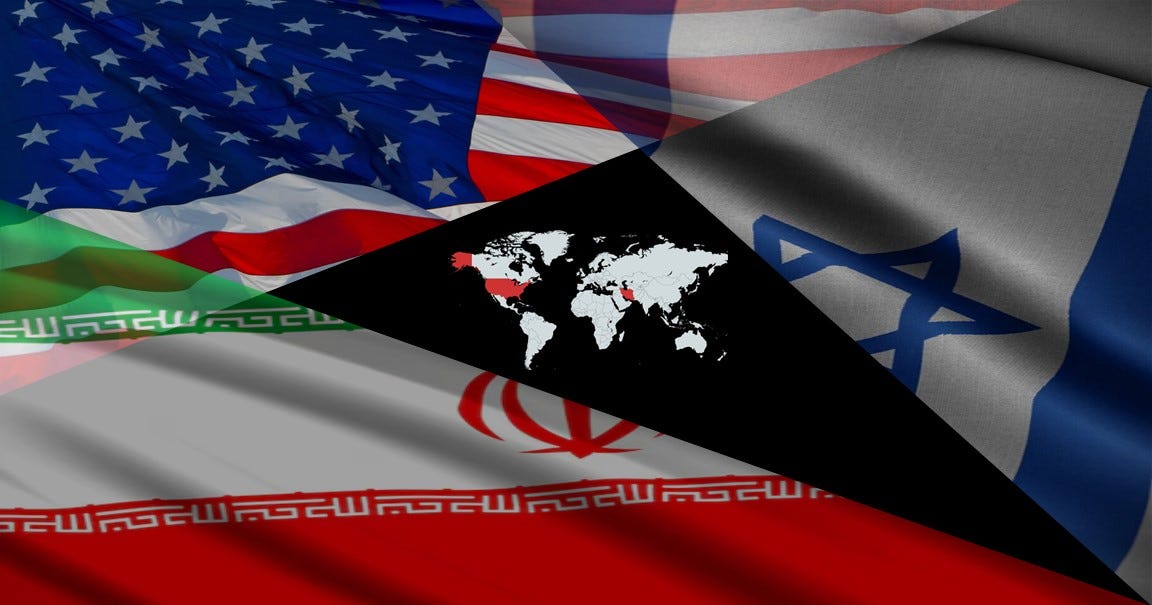
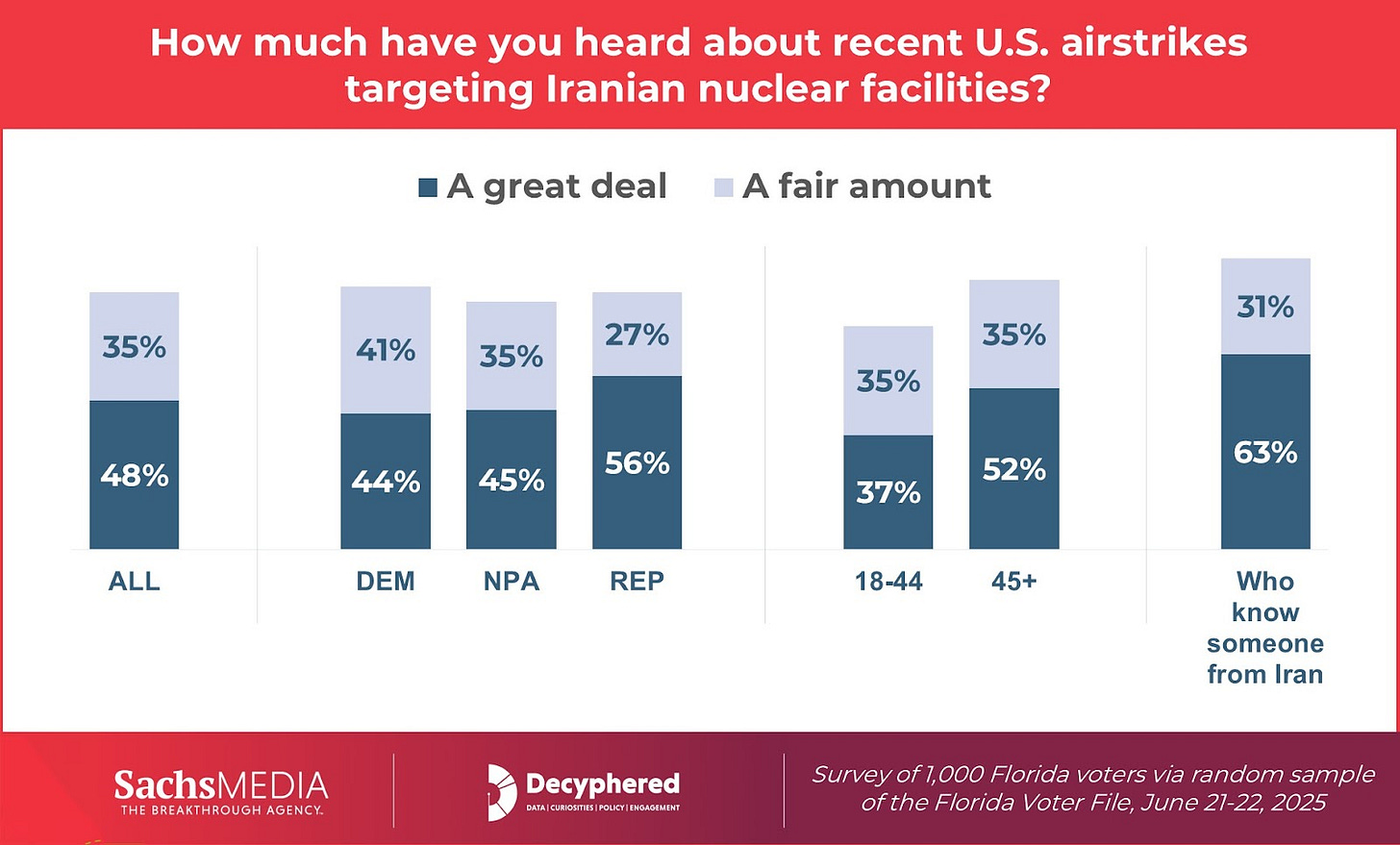
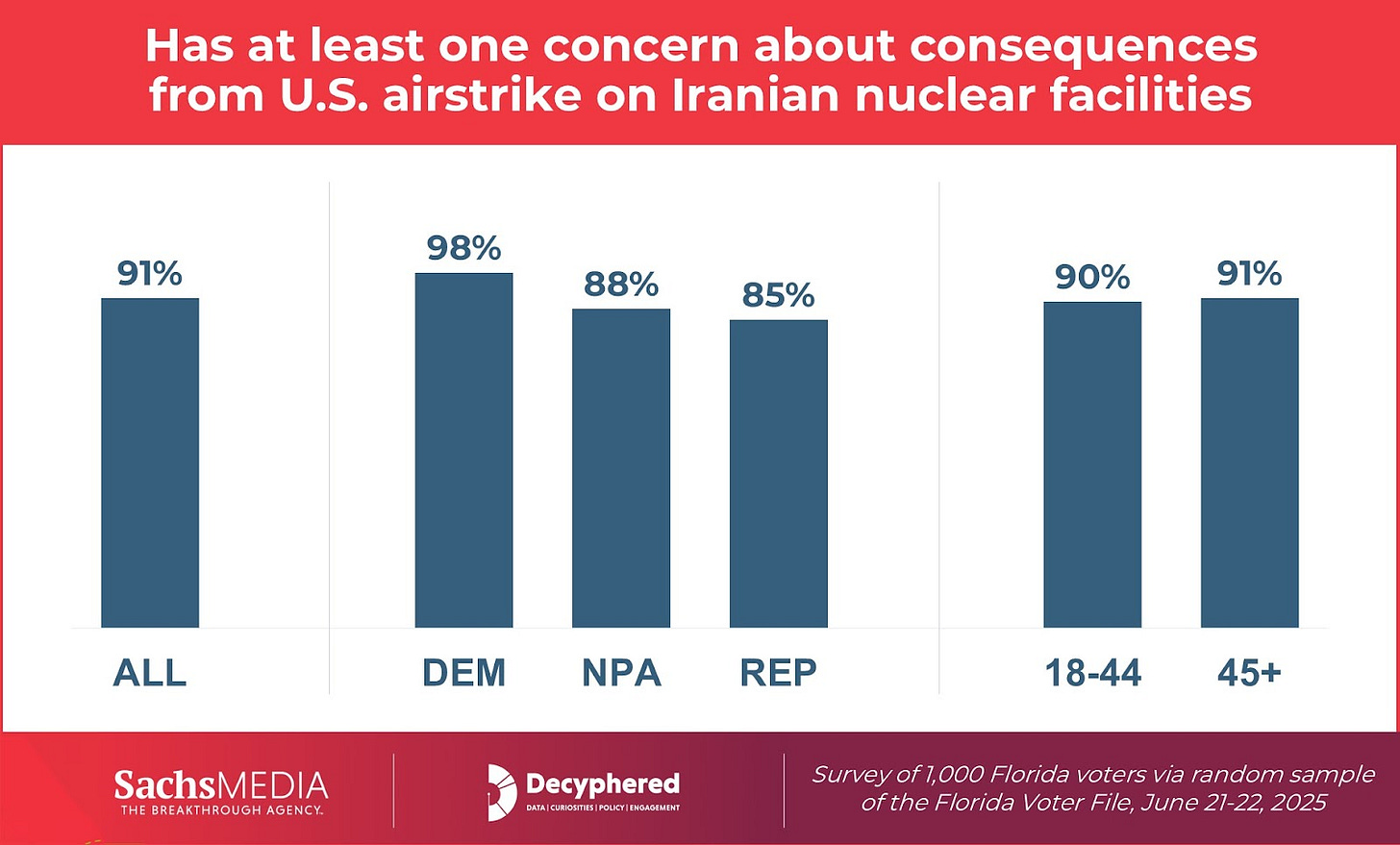
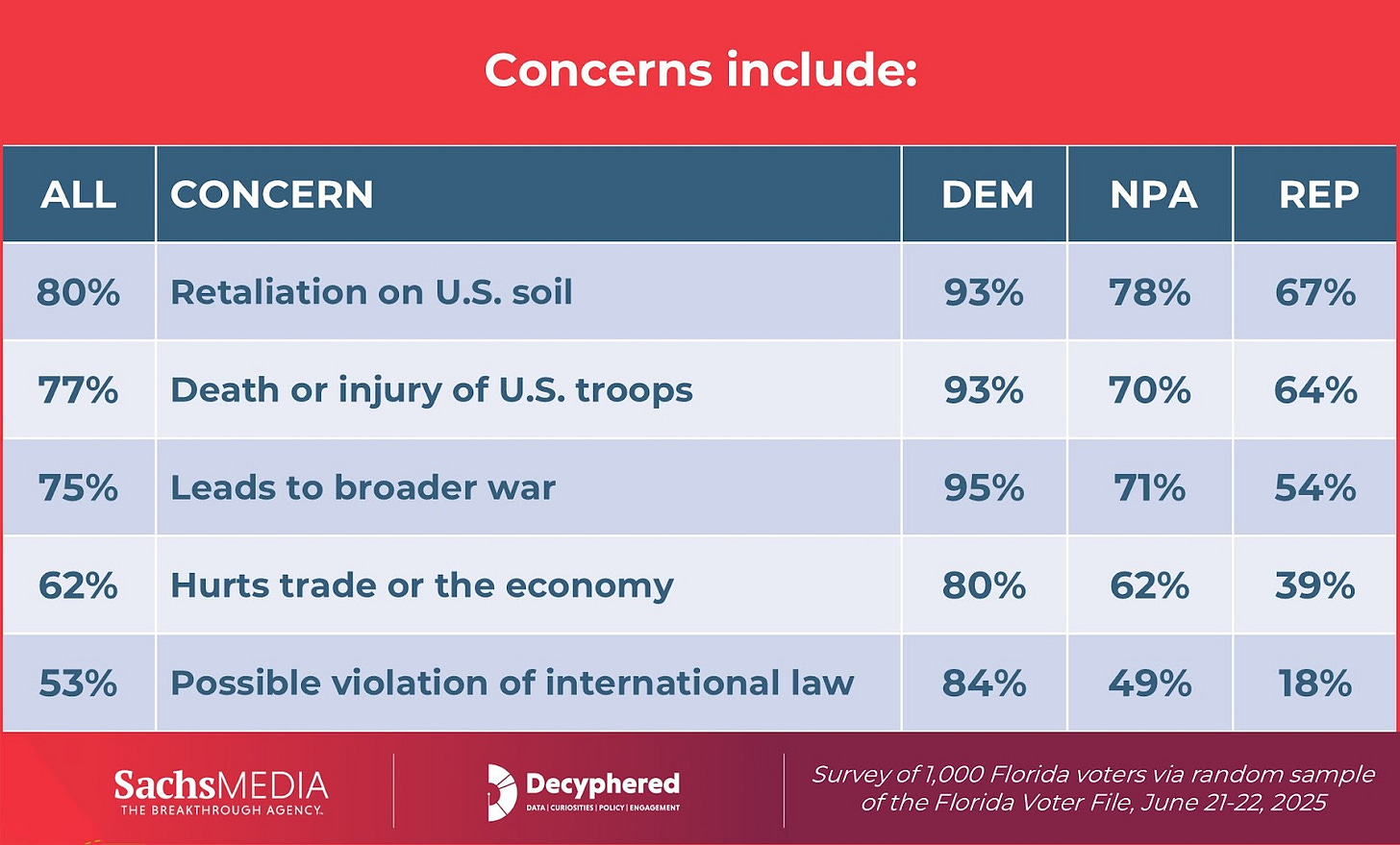
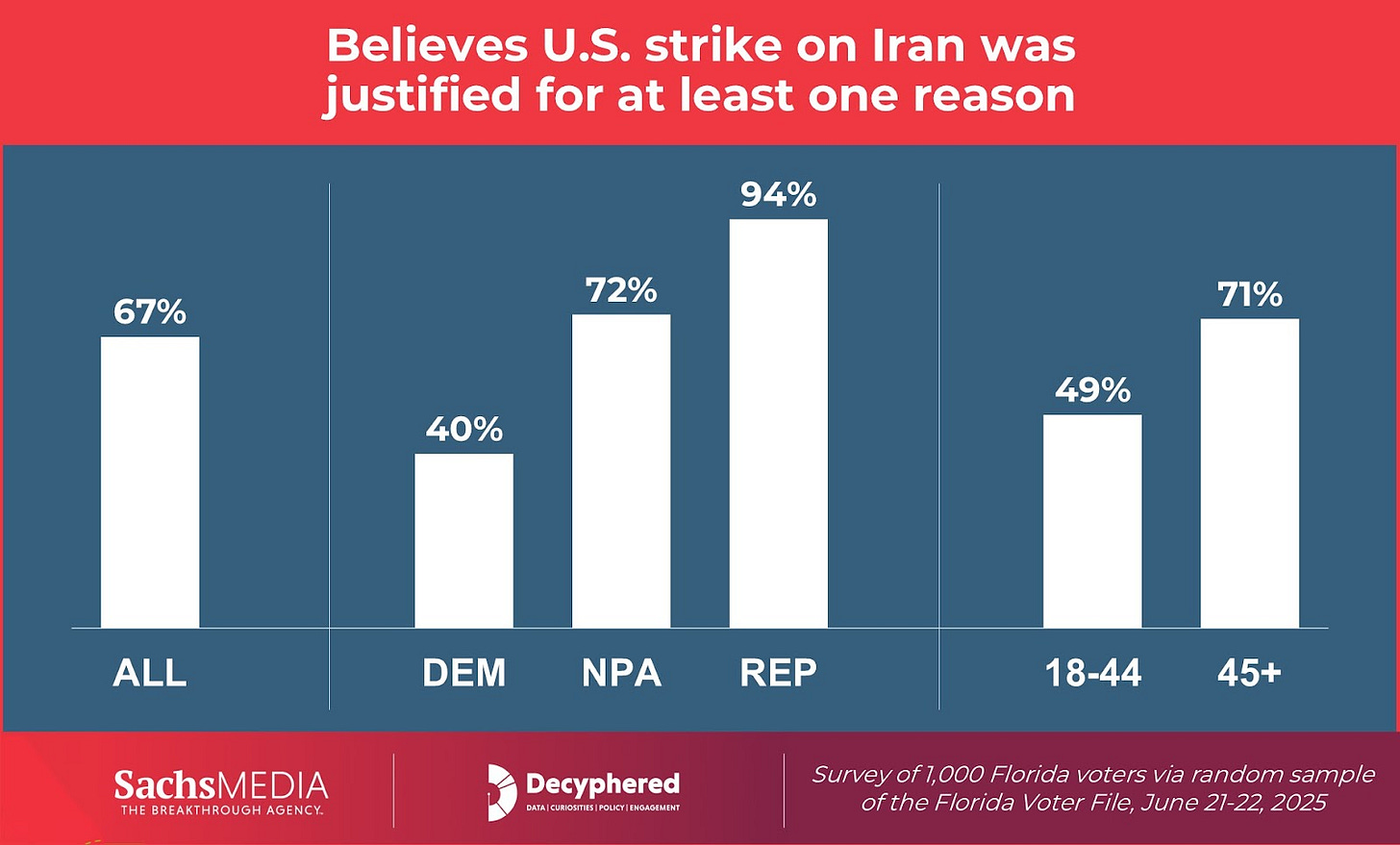
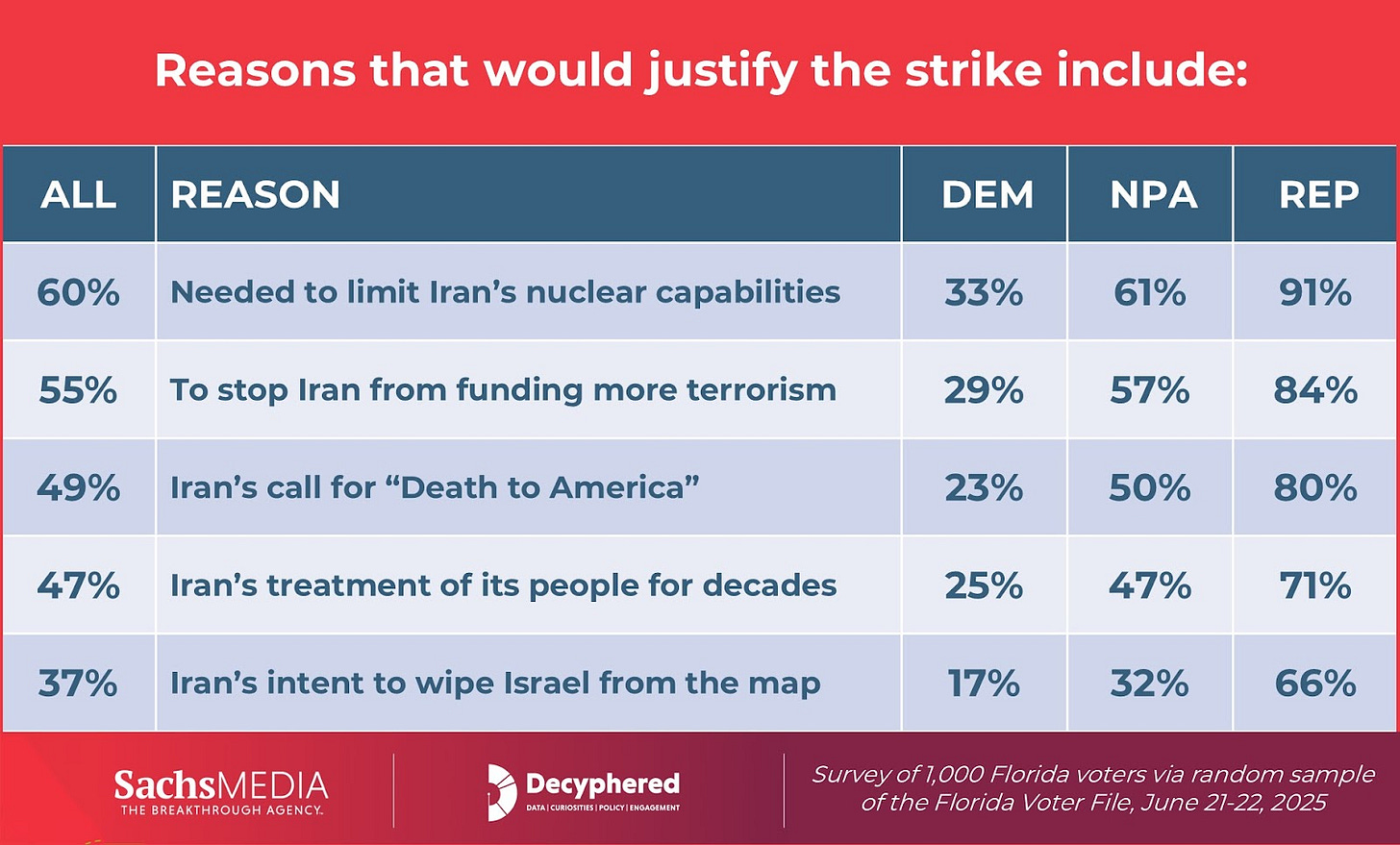
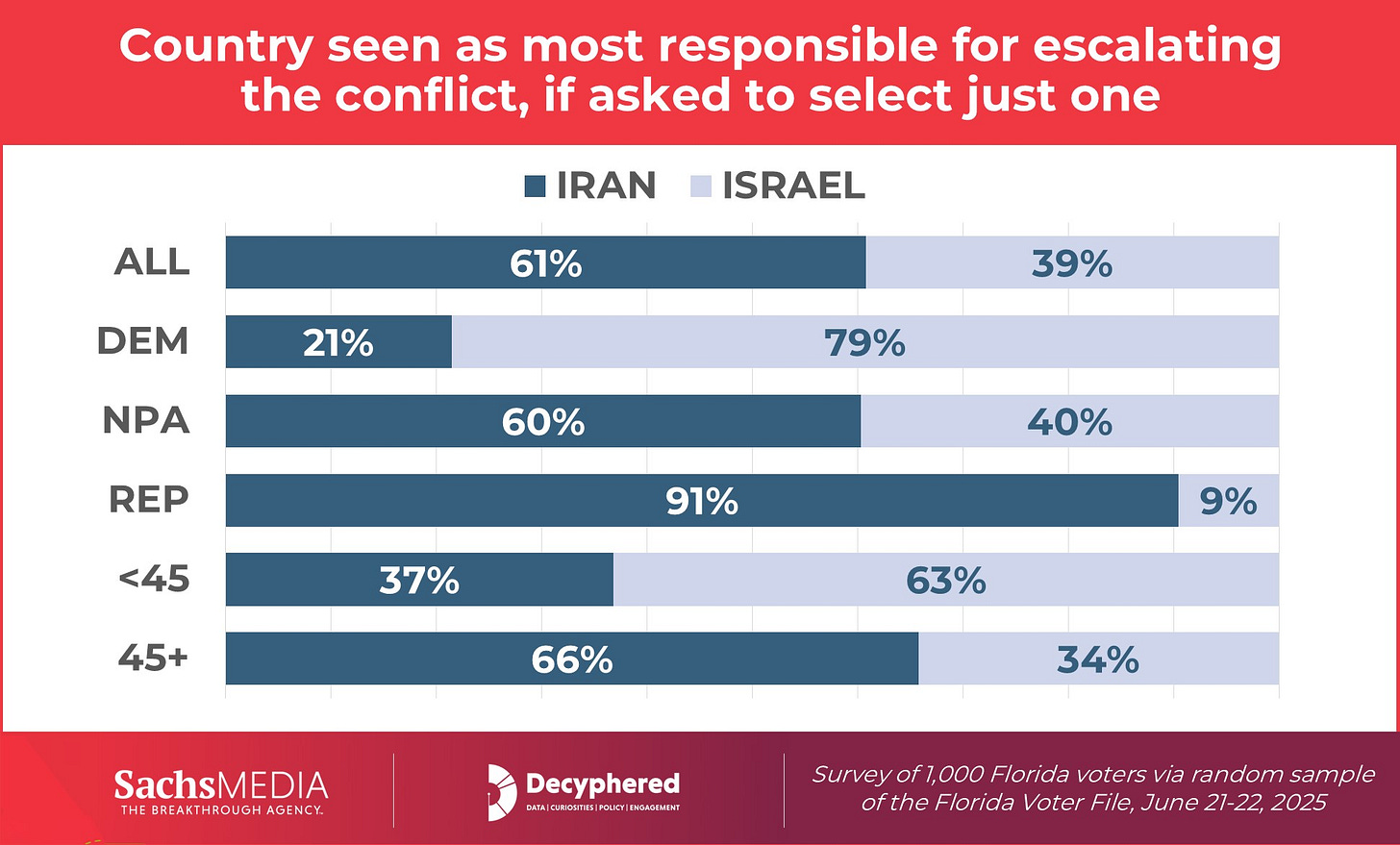
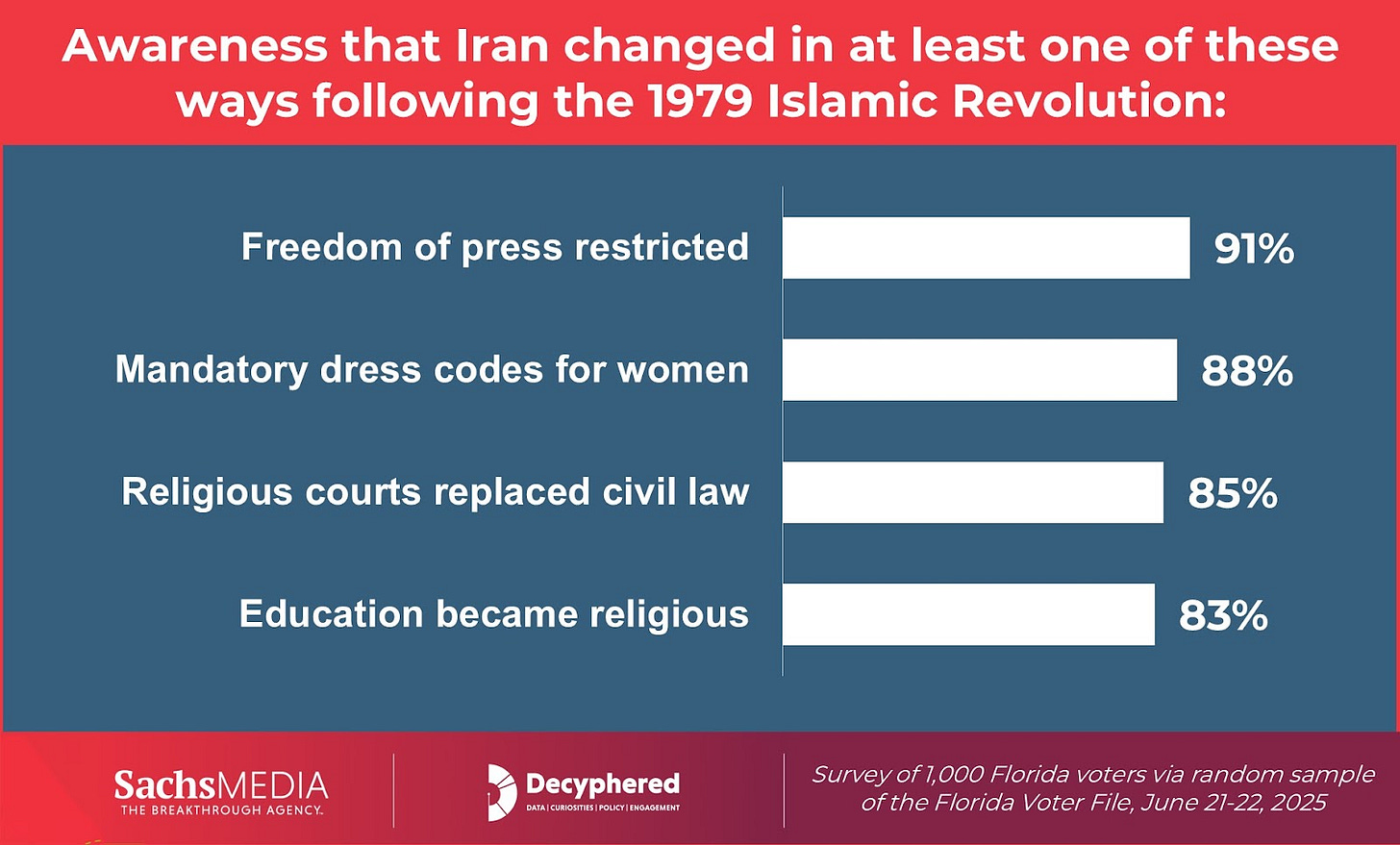
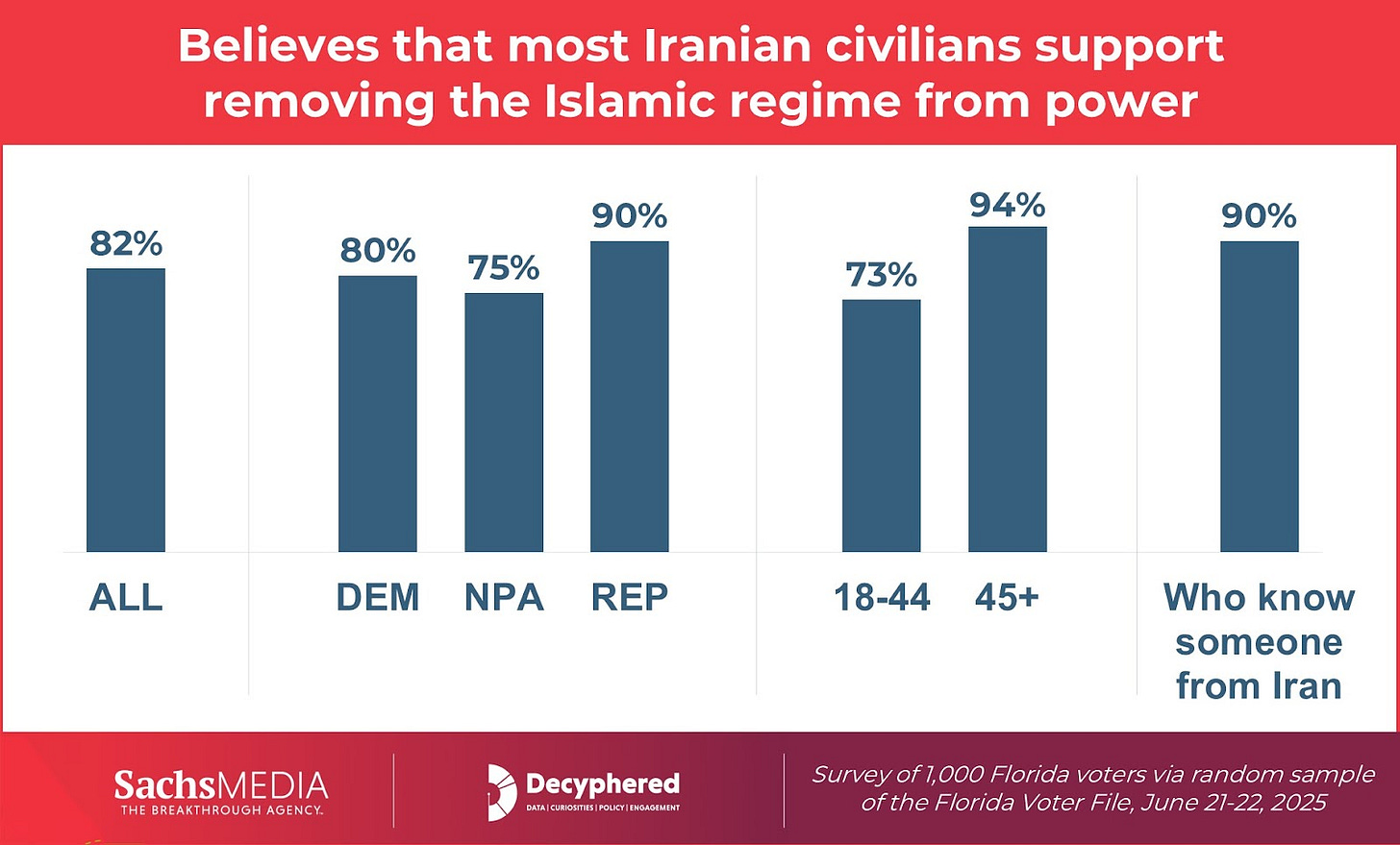
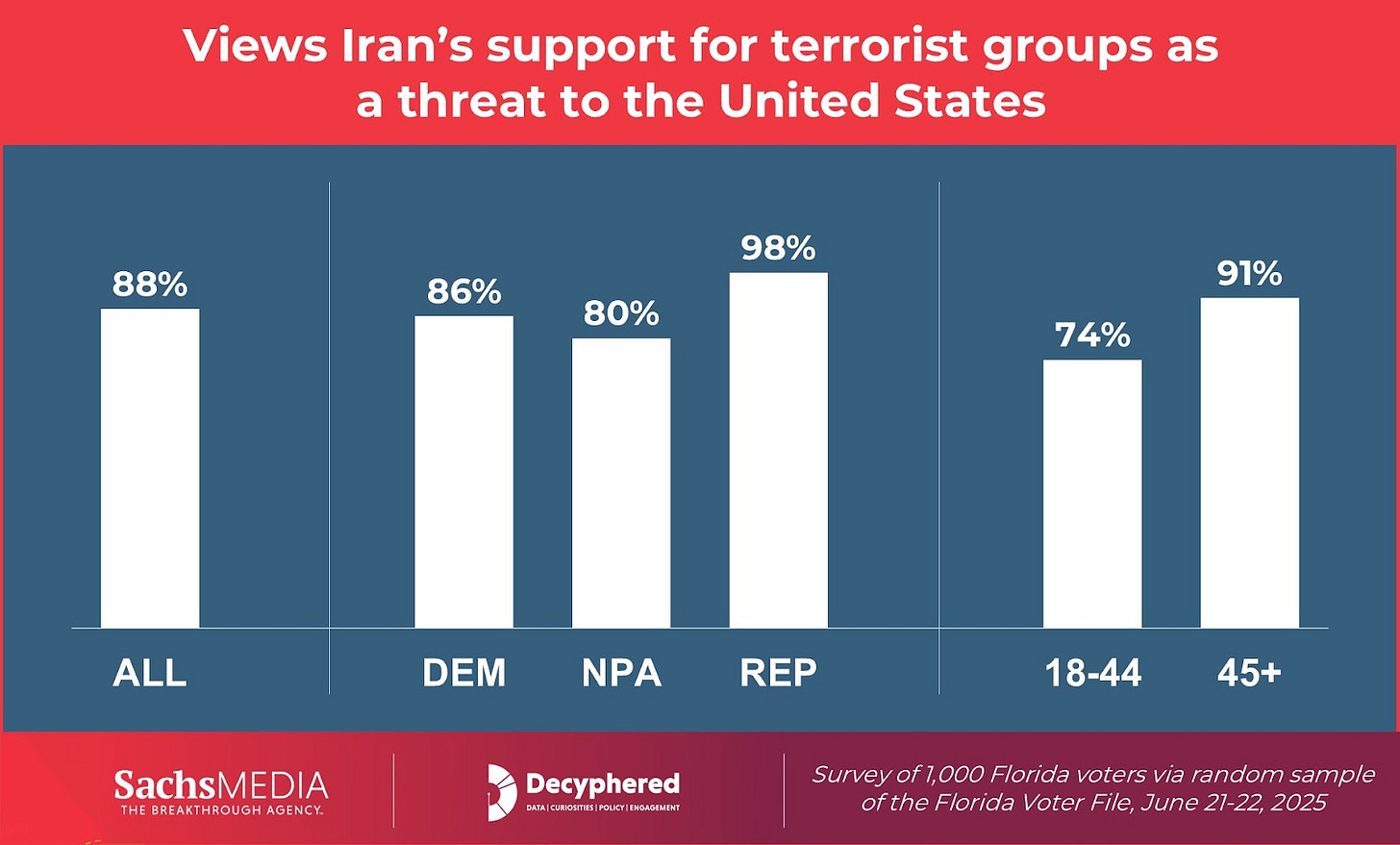
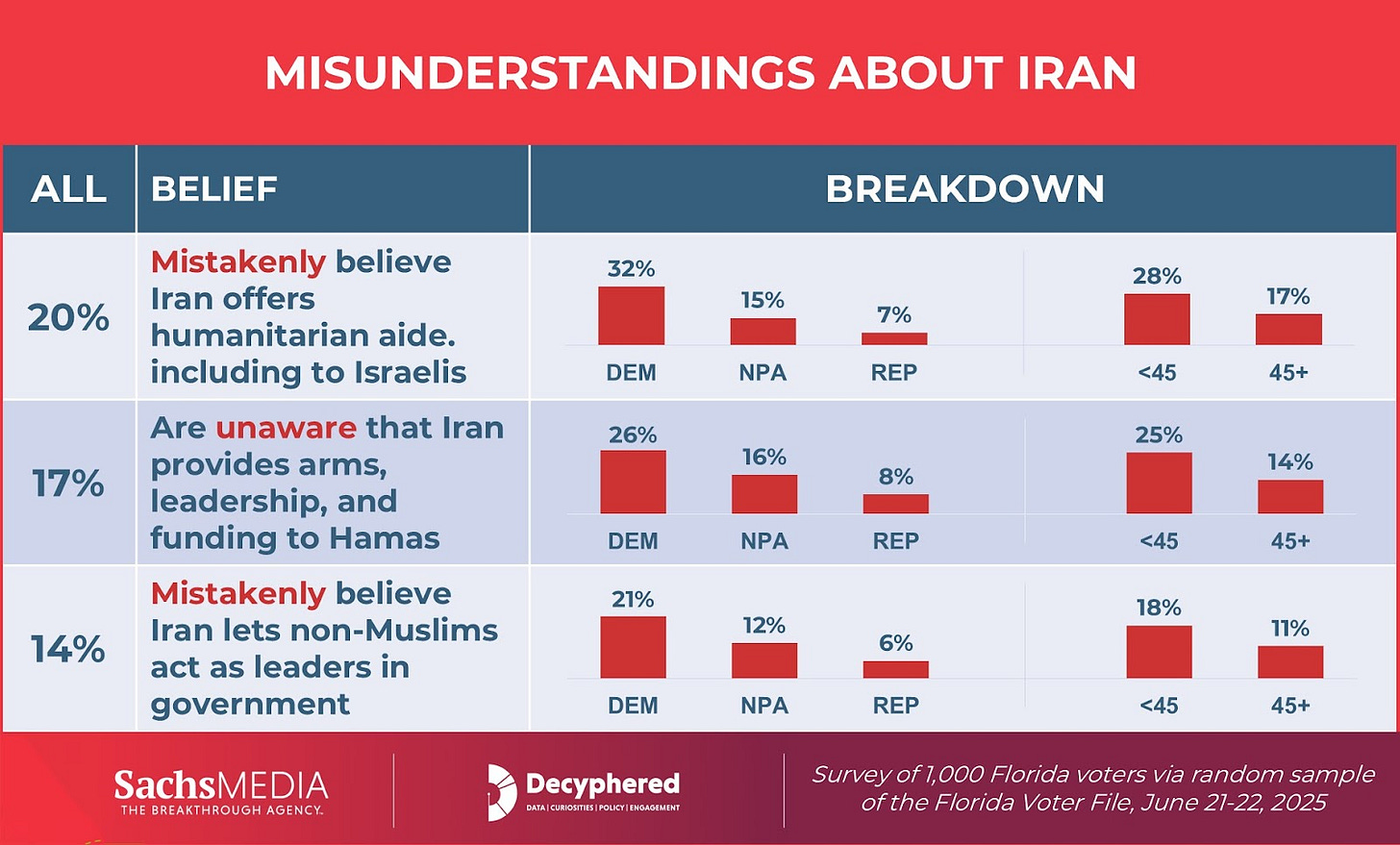
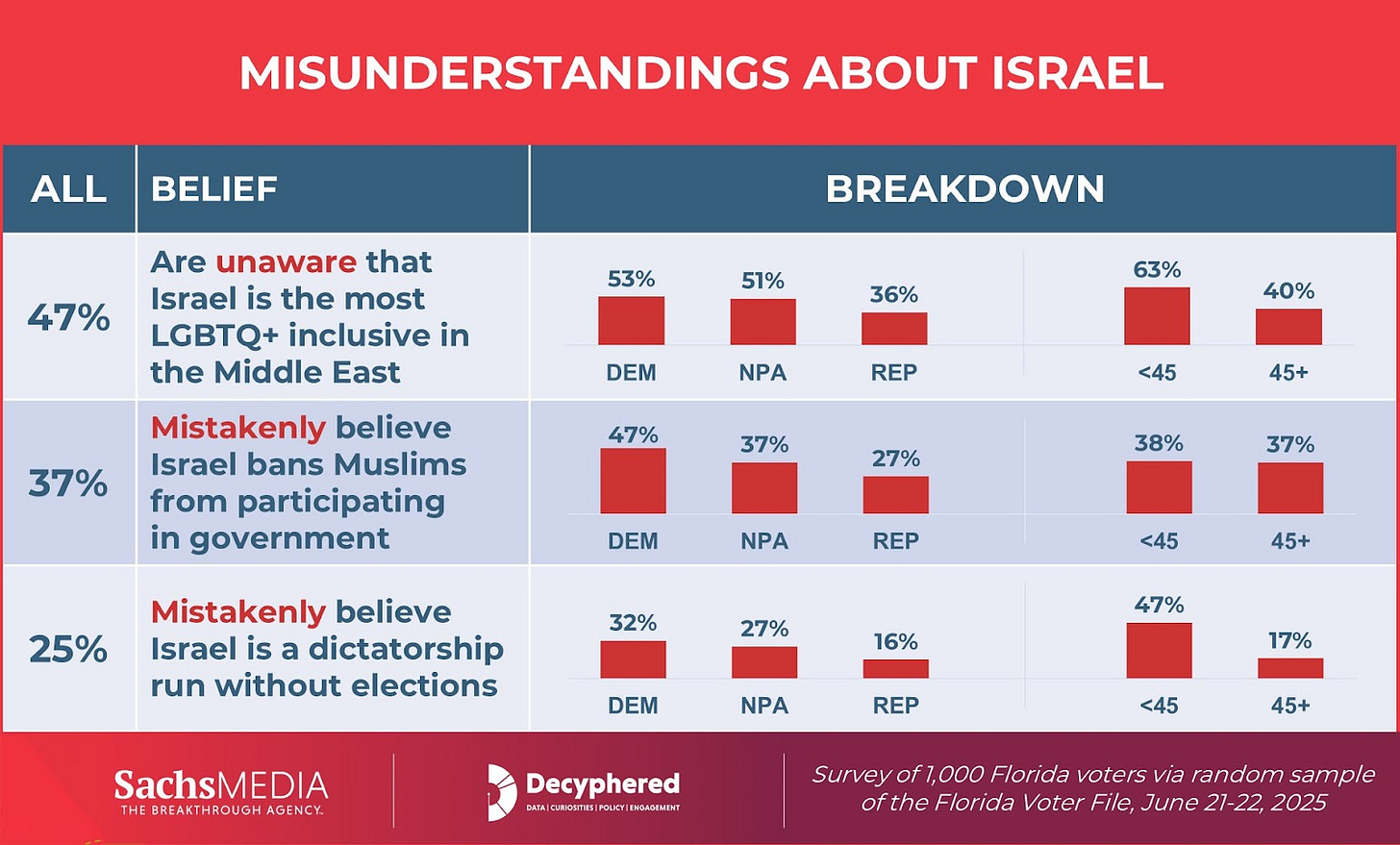
Dems are telling Jewish Dems that we are not wanted in the party. They told you that in FL and the told us all that in NYC. I believe them, and I am out for good now.